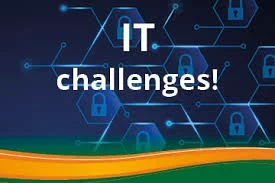Information Technology
The Information Technology (IT) industry is a rapidly evolving sector that encompasses a wide range of products and services. Some key aspects include:
Trends
1. Artificial Intelligence (AI):
AI-powered solutions transforming industries, from customer
service to healthcare.
2. Cloud Computing: Cloud-based
infrastructure, platforms, and software enabling scalability
and flexibility.
3. Cybersecurity: Protecting
against cyber threats, data breaches, and ensuring digital
security.

Challenges
1. Data Management: Managing vast
amounts of data, ensuring data quality, and
compliance.
2. Digital Transformation:
Integrating digital technology into all areas of business,
driving innovation and efficiency.
3. Talent Acquisition and
Retention: Attracting and retaining skilled IT professionals in
a competitive market.

Opportunities
1. Innovation: Developing new
technologies, products, and services that drive business growth
and improve lives.
2. Digital Inclusion: Expanding
access to technology, bridging the digital divide, and
promoting digital literacy.
3. Global Reach: IT enables
businesses to reach a global audience, facilitating
international trade and collaboration.

Future Directions
1. Quantum Computing:
Next-generation computing that solves complex problems
exponentially faster.
2. Internet of Things (IoT):
Connecting devices, sensors, and systems to drive innovation
and efficiency.
3. 5G and Beyond: Next-generation
wireless networks enabling faster, more reliable, and
ubiquitous connectivity.

The IT industry is constantly evolving, with emerging technologies and trends shaping the future. Some key areas include:
Emerging
Technologies
1. Artificial Intelligence (AI):
AI-powered solutions transforming industries, from customer
service to healthcare.
2. Internet of Things (IoT):
Connecting devices, sensors, and systems to drive innovation
and efficiency.
3. Blockchain: Secure,
decentralized, and transparent ledger technology for various
applications.

Industry Trends
1. Cloud Computing: Cloud-based
infrastructure, platforms, and software enabling scalability
and flexibility.
2. Cybersecurity: Protecting
against cyber threats, data breaches, and ensuring digital
security.
3. Digital Transformation:
Integrating digital technology into all areas of business,
driving innovation and efficiency.
Impact on Society
1. Digital Inclusion: Expanding
access to technology, bridging the digital divide, and
promoting digital literacy.
2. Job Market Evolution: IT
industry creating new job opportunities and requiring
continuous skill development.
3. Global Connectivity: IT
enabling global communication, collaboration, and economic
growth.
